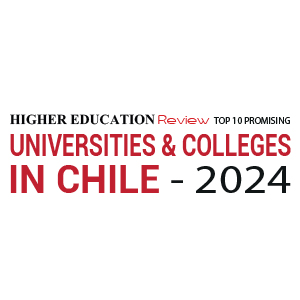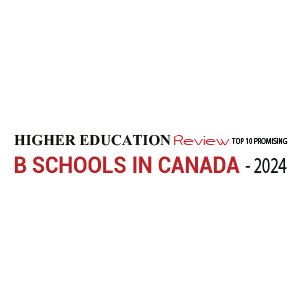
UQTR: Driven With The Vision To Nurture Future Industry Leaders
By Sebastien Charles, Vice-President Research & Development
Aprominent French-language university located in Trois-Rivieres, Quebec, Canada, Universite du Quebec a Trois- Rivieres (UQTR), established in 1969, is part of the Universite du Quebec network, known for its academic excellence and research contributions. This network emerged during a period marked by the widespread access to higher education in Western societies. The primary objective behind this initiative was to provide access to higher education for individuals whose families had no prior university experience. UQTR, currently accommodating over 15,000 students, including a quarter of international students, and boasting more than 120,000 alumni since its inception, has effectively fulfilled the initial expectations set forth.
Within the Universite du Quebec network, each institution has distinct missions aimed at developing specific realms of teaching and research, thereby contributing to the enhancement of educational standards in Canada. UQTR has directed its focus towards health, engineering, management, environmental sciences, education, humanities, and social sciences. Through the establishment of seven internationally renowned research centers and institutes in these disciplines, UQTR has significantly augmented Canada's knowledge landscape at the postgraduate level, offering distinctive and continuously evolving programs grounded in contemporary research discoveries.
”By closely attending to the needs of the communities it serves, UQTR has implemented several strategies aimed at preparing its students for seamless integration into the workforce upon completion of their education”
Despite being a comprehensive university, UQTR has made a deliberate effort to stand out within its operational domains. This commitment is evident through its provision of distinctive programs in Quebec, particularly in fields such as health (chiropractic, midwifery, podiatry), leisure and sports (e-sports), administration (SME), engineering (hydrogen), social sciences (family studies), and humanities (Quebec studies).
Additionally, UQTR hosts university clinics and testing facilities across its various campuses, providing students with internship opportunities and equipping them for their future careers.
By closely attending to the needs of the communities it serves, UQTR has implemented several strategies aimed at preparing its students for seamless integration into the workforce upon completion of their education. An illustrative instance is its unique initiative as the sole Canadian university to offer an undergraduate mechanical engineering program in collaboration with industry partners, commencing from the students' first year. This cooperative program is presently expanding to encompass other fields of study. As a full-fledged member of MITACS, a Canadian entity facilitating paid
internships for postgraduate students, UQTR enables numerous students to align their research with industry requirements, notably within the realms of Industry 4.0 and environmentally sustainable technologies. These areas constitute the focal points of the Energy Transition Valley Innovation Zone, where Trois-Rivieres serves as the epicenter.
Regarded as one of Quebec's foremost collaborative educational institutions, UQTR stands out with its yearly commitment to more than four hundred partnerships and nearly $20 million in research collaborations. Its establishment of the National Integrated Center for Intelligent Manufacturing in 2022, made possible through industry funding, underscores UQTR's significant emphasis on engaging with the sectors it serves, encompassing not just industry but also health, education, and culture.
UQTR employs stringent and competitive procedures for recruiting adept and seasoned faculty members. This involves widespread advertisement of positions, comprehensive interviews, and evaluations based on candidates' academic qualifications, teaching background, and research accomplishments. Moreover, UQTR prioritizes fostering the professional growth of its faculty by endorsing participation in mentorship initiatives and facilitating their engagement with the latest advancements in their respective fields.
Additionally, the university has established explicit criteria for faculty promotion and tenure, guiding their career progression. Notably, both internal and external teaching and research chair programs are in place to nurture exceptional professors and attract international talent.
Benefiting from cutting-edge infrastructure characteristic of a modern university, UQTR boasts state-of-the-art facilities for both teaching and research. These include well-equipped modern classrooms, specialized laboratories, computer labs, extensive library resources, research centers, collaborative student spaces, sports and recreation facilities, student accommodations, dining venues, and health and wellness centers. Two recent infrastructural additions, the National Integrated Intelligent Manufacturing Center (completed in 2022) and the Green and Sustainable Technologies Research Pavilion (completed in 2025), stand as testament to this commitment.
Financial support for students remains a paramount focus at UQTR, which offers various scholarship programs tailored to assist its student body. These programs may vary based on academic level, field of study, or financial need, typically awarded for admissions, academic excellence, or research endeavors. Moreover, students have opportunities to finance their studies through teaching or research assistantships, and at the graduate level, by managing course loads. Notably, UQTR stands as the sole university in Quebec to grant scholarships to all doctoral students through the Universalis causa Program, providing full exemption from differential fees for international students.
With close to 400 distinct study programs and a dedicated Office for the Development of Experiential Learning overseeing internships, UQTR provides an extensive array of courses, seminars, and internships catering to the diverse needs of its student populace.
As outlined in its 2020-2025 Strategic Plan, the Universite du Quebec a Trois-Rivieres (UQTR) has highlighted the evolution of its educational and research practices in the digital era as a key priority. This strategic focus involves embracing and leveraging innovations in the digital landscape while critically assessing the applications of emerging technologies. The recent establishment of an AI Ethics Chair at UQTR serves as a platform for deliberating on the merits and drawbacks of these novel technologies.
Beyond providing students with an exclusive and tailored educational journey within a closely-knit university environment where approachable professors actively support their success, UQTR distinguishes itself through the excellence of its academic programs and the pioneering nature of its research initiatives. Evidently, the university's consistent ranking among the seven Canadian institutions experiencing the most significant percentage increase in research grants in 2020, 2021, and 2022 attests to its remarkable standing and innovative pursuits.
After obtaining a master's degree in philosophy at the Universite de Nancy 2 (1995) and then a Ph.D. in philosophy at the University of Ottawa (2001), Sebastien Charles began his career at Sherbrooke University in 2001 before joining UQTR in 2014. In parallel with his activities as a professor-researcher, he has held various positions in university administration, being in turn Vice-Dean for research (Sherbrooke University, 2002-2004), Dean of Research and Innovation (UQTR, 2014-2018) and, since 2018, Vice-President Research and Development (UQTR).
A specialist in Modern and Contemporary philosophy, he has published and co-edited numerous works on French and English thought from Montaigne to the Enlightenment, while focusing on the specific issues of current democratic societies and their changes, notably through the notion of hypermodernity (Hypermodern Times, Polity Press, 2005).
Within the Universite du Quebec network, each institution has distinct missions aimed at developing specific realms of teaching and research, thereby contributing to the enhancement of educational standards in Canada. UQTR has directed its focus towards health, engineering, management, environmental sciences, education, humanities, and social sciences. Through the establishment of seven internationally renowned research centers and institutes in these disciplines, UQTR has significantly augmented Canada's knowledge landscape at the postgraduate level, offering distinctive and continuously evolving programs grounded in contemporary research discoveries.
”By closely attending to the needs of the communities it serves, UQTR has implemented several strategies aimed at preparing its students for seamless integration into the workforce upon completion of their education”
Despite being a comprehensive university, UQTR has made a deliberate effort to stand out within its operational domains. This commitment is evident through its provision of distinctive programs in Quebec, particularly in fields such as health (chiropractic, midwifery, podiatry), leisure and sports (e-sports), administration (SME), engineering (hydrogen), social sciences (family studies), and humanities (Quebec studies).
Additionally, UQTR hosts university clinics and testing facilities across its various campuses, providing students with internship opportunities and equipping them for their future careers.
Pioneering Collaboration & Industry Integration
By closely attending to the needs of the communities it serves, UQTR has implemented several strategies aimed at preparing its students for seamless integration into the workforce upon completion of their education. An illustrative instance is its unique initiative as the sole Canadian university to offer an undergraduate mechanical engineering program in collaboration with industry partners, commencing from the students' first year. This cooperative program is presently expanding to encompass other fields of study. As a full-fledged member of MITACS, a Canadian entity facilitating paid
internships for postgraduate students, UQTR enables numerous students to align their research with industry requirements, notably within the realms of Industry 4.0 and environmentally sustainable technologies. These areas constitute the focal points of the Energy Transition Valley Innovation Zone, where Trois-Rivieres serves as the epicenter.
Regarded as one of Quebec's foremost collaborative educational institutions, UQTR stands out with its yearly commitment to more than four hundred partnerships and nearly $20 million in research collaborations. Its establishment of the National Integrated Center for Intelligent Manufacturing in 2022, made possible through industry funding, underscores UQTR's significant emphasis on engaging with the sectors it serves, encompassing not just industry but also health, education, and culture.
Commitment to Excellence in Faculty, Infrastructure, & Student Support
UQTR employs stringent and competitive procedures for recruiting adept and seasoned faculty members. This involves widespread advertisement of positions, comprehensive interviews, and evaluations based on candidates' academic qualifications, teaching background, and research accomplishments. Moreover, UQTR prioritizes fostering the professional growth of its faculty by endorsing participation in mentorship initiatives and facilitating their engagement with the latest advancements in their respective fields.
Additionally, the university has established explicit criteria for faculty promotion and tenure, guiding their career progression. Notably, both internal and external teaching and research chair programs are in place to nurture exceptional professors and attract international talent.
Benefiting from cutting-edge infrastructure characteristic of a modern university, UQTR boasts state-of-the-art facilities for both teaching and research. These include well-equipped modern classrooms, specialized laboratories, computer labs, extensive library resources, research centers, collaborative student spaces, sports and recreation facilities, student accommodations, dining venues, and health and wellness centers. Two recent infrastructural additions, the National Integrated Intelligent Manufacturing Center (completed in 2022) and the Green and Sustainable Technologies Research Pavilion (completed in 2025), stand as testament to this commitment.
Financial support for students remains a paramount focus at UQTR, which offers various scholarship programs tailored to assist its student body. These programs may vary based on academic level, field of study, or financial need, typically awarded for admissions, academic excellence, or research endeavors. Moreover, students have opportunities to finance their studies through teaching or research assistantships, and at the graduate level, by managing course loads. Notably, UQTR stands as the sole university in Quebec to grant scholarships to all doctoral students through the Universalis causa Program, providing full exemption from differential fees for international students.
With close to 400 distinct study programs and a dedicated Office for the Development of Experiential Learning overseeing internships, UQTR provides an extensive array of courses, seminars, and internships catering to the diverse needs of its student populace.
A Future of Strategic Evolution
As outlined in its 2020-2025 Strategic Plan, the Universite du Quebec a Trois-Rivieres (UQTR) has highlighted the evolution of its educational and research practices in the digital era as a key priority. This strategic focus involves embracing and leveraging innovations in the digital landscape while critically assessing the applications of emerging technologies. The recent establishment of an AI Ethics Chair at UQTR serves as a platform for deliberating on the merits and drawbacks of these novel technologies.
Beyond providing students with an exclusive and tailored educational journey within a closely-knit university environment where approachable professors actively support their success, UQTR distinguishes itself through the excellence of its academic programs and the pioneering nature of its research initiatives. Evidently, the university's consistent ranking among the seven Canadian institutions experiencing the most significant percentage increase in research grants in 2020, 2021, and 2022 attests to its remarkable standing and innovative pursuits.
Sebastien Charles, Vice-President Research & Development
After obtaining a master's degree in philosophy at the Universite de Nancy 2 (1995) and then a Ph.D. in philosophy at the University of Ottawa (2001), Sebastien Charles began his career at Sherbrooke University in 2001 before joining UQTR in 2014. In parallel with his activities as a professor-researcher, he has held various positions in university administration, being in turn Vice-Dean for research (Sherbrooke University, 2002-2004), Dean of Research and Innovation (UQTR, 2014-2018) and, since 2018, Vice-President Research and Development (UQTR).
A specialist in Modern and Contemporary philosophy, he has published and co-edited numerous works on French and English thought from Montaigne to the Enlightenment, while focusing on the specific issues of current democratic societies and their changes, notably through the notion of hypermodernity (Hypermodern Times, Polity Press, 2005).



